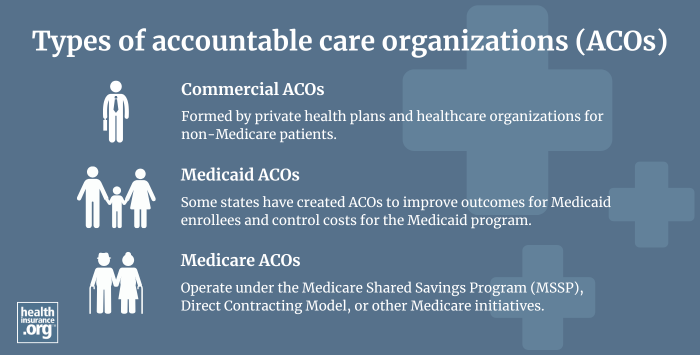
What is an accountable care organization?
An accountable care organization (ACO) is a health care delivery model envisioned by the Affordable Care Act (ACA) in which a group of doctors, hospitals and other medical providers work together to coordinate care for people enrolled in Original Medicare. Although the concept was originally specific to Medicare — and continues to be used mostly in that context — ACOs are also now used in the private sector as well.1
Many Medicare beneficiaries have several chronic conditions and see several different doctors. An ACO helps to coordinate the patient's care and ensure that it's provided as efficiently as possible, without duplicating services. Participating providers in an ACO are still paid on a fee-for-service basis, as is the case for all Original Medicare claims. However, they can earn more if they keep costs down while meeting quality targets. If the ACO saves money, the savings are shared between the ACO and the Medicare program.2
ACOs are part of the Original Medicare program.3 Medicare Advantage is different, and private Medicare Advantage insurers have their own methodologies for targeting cost efficiency and high-quality care.
As of January 2023, there were almost 11 million Medicare beneficiaries assigned to 456 ACOs across the country. And in 2021, ACOs had a total shared savings (shared with Medicare) of $2 billion.4 For perspective, there were about 34.3 million Original Medicare beneficiaries at that point,5 so about one-third were assigned to ACOs.
ACOs are not a type of health care plan; in other words, they're not in the same acronym category as HMO, PPO, EPO, and POS. So you don't "enroll" in an ACO as a type of coverage. Medicare can assign you to an ACO but if you have Original Medicare, you're able to receive care from any doctor who accepts Medicare, regardless of whether they're part of the ACO.6
Footnotes
- "Understanding the Basics of Accountable Care Organizations" Tech Target. May 23, 2017 ⤶
- "Accountable Care Organizations (ACOs): General Information" CMS.gov. Accessed Oct. 1, 2024 ⤶
- "Accountable Care Organizations and Medicare Advantage" CMS.gov. Published Oct. 2022; Accessed Oct 1, 2024 ⤶
- "Shared Savings Program Fast Facts – As of January 1, 2023" CMS.gov. Jan. 1, 2023 ⤶
- "Medicare Monthly Enrollment — January 2023" CMS.gov. Accessed Oct. 1, 2024 ⤶
- "What is a Medicare Accountable Care Organization? Can I enroll in one when I sign up for Medicare or during the Medicare Open Enrollment period?" KFF.org. Accessed Oct. 1, 2024 ⤶


